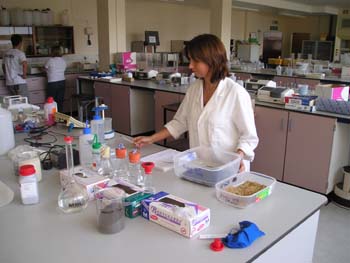Graduate Consultancy scheme leads to employment

A Lancaster postgraduate says she could not have obtained her current job without the experience and contacts provided through her industry placement.
Lancaster is one of the few UK universities to offer exclusively commercial placements to students taking Masters degrees in environmental science.
Olivia Thompson chose Lancaster for her MSc in Pollution and Protection, which included a six month Graduate Consultancy for the nuclear technology firm Nexia Solutions.The project she undertook for the firm was so successful that as well as securing her a job, she was awarded a University prize for the best Masters project in environmental science.
She said: “It was a fantastic opportunity to carry out a project in industry and make contacts. Then I heard about a job coming up through my supervisor at Nexia and when I applied for it, I already had the experience and the knowledge of the company.I wouldn’t even have known about the job if I hadn’t done my project there.”
She is one of dozens of science postgraduates from the Lancaster Environment Centre (LEC) who are handpicked every year to undertake individual graduate consultancy projects in companies ranging from vegetable processors to paper mills.
The projects have been set up by the University-based DESIRE – Delivering Environmental Solutions Into Regional Enterprise project – which is funded by the European Regional Development Fund.
The University is now looking to recruit over 70 more North West businesses to work with DESIRE and its sister project DESIRE for REACh, a project that will help companies that produce, import or use chemicals to comply with the new European ‘Registration, Evaluation and Authorisation of Chemicals’ (REACh) legislation. The two projects together have a combined value of £1.12m of funding available and will run to the end of March 2008.
Through the Graduate Consultancy programme, businesses gain access to academic expertise at LEC which is one of the largest environmental research groups in Europe.
Projects carried out range from introducing environmental improvement programmes and legislative compliance to environmental impact assessments.
Olivia’s project at Nexia Solutions looked at the monitoring of permeable reactive barriers for containing nuclear radionuclides at contaminated land sites.
She said: “I chose Lancaster for my Masters because I knew I’d be doing an industrial placement and I’d recommend it to anyone considering an MSc because it’s great experience.”
Dr James Brydie, senior research technologist at Nexia Solutions, said the collaboration with the University through Olivia’s project had proved useful and rewarding.
He said: “The high quality of the research may result in a better understanding of in situ chemical processes, as well as reducing the cost and increasing the effectiveness of contaminated groundwater remediation.”
DESIRE project manager Mike Entwistle said: “Many of the postgraduates that have enrolled on the programme chose to come to Lancaster chiefly to take advantage of the industrial placement opportunities. There are still relatively few Universities that offer this kind of programme and it appears to have been very attractive. It’s far more than work experience, it’s a proper consultancy project which some companies couldn’t otherwise afford.”
http://www.lec.lancs.ac.uk/index.htm